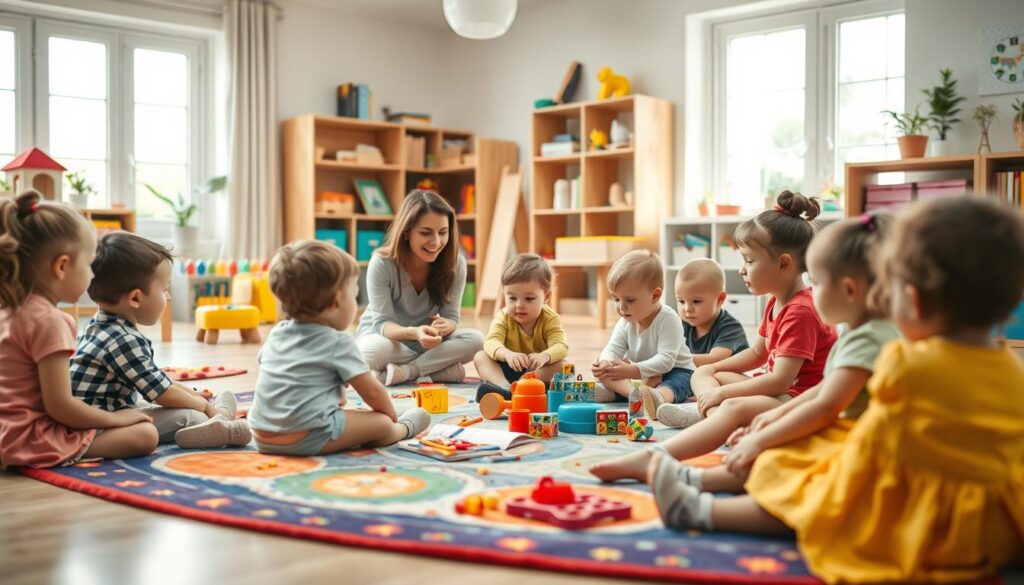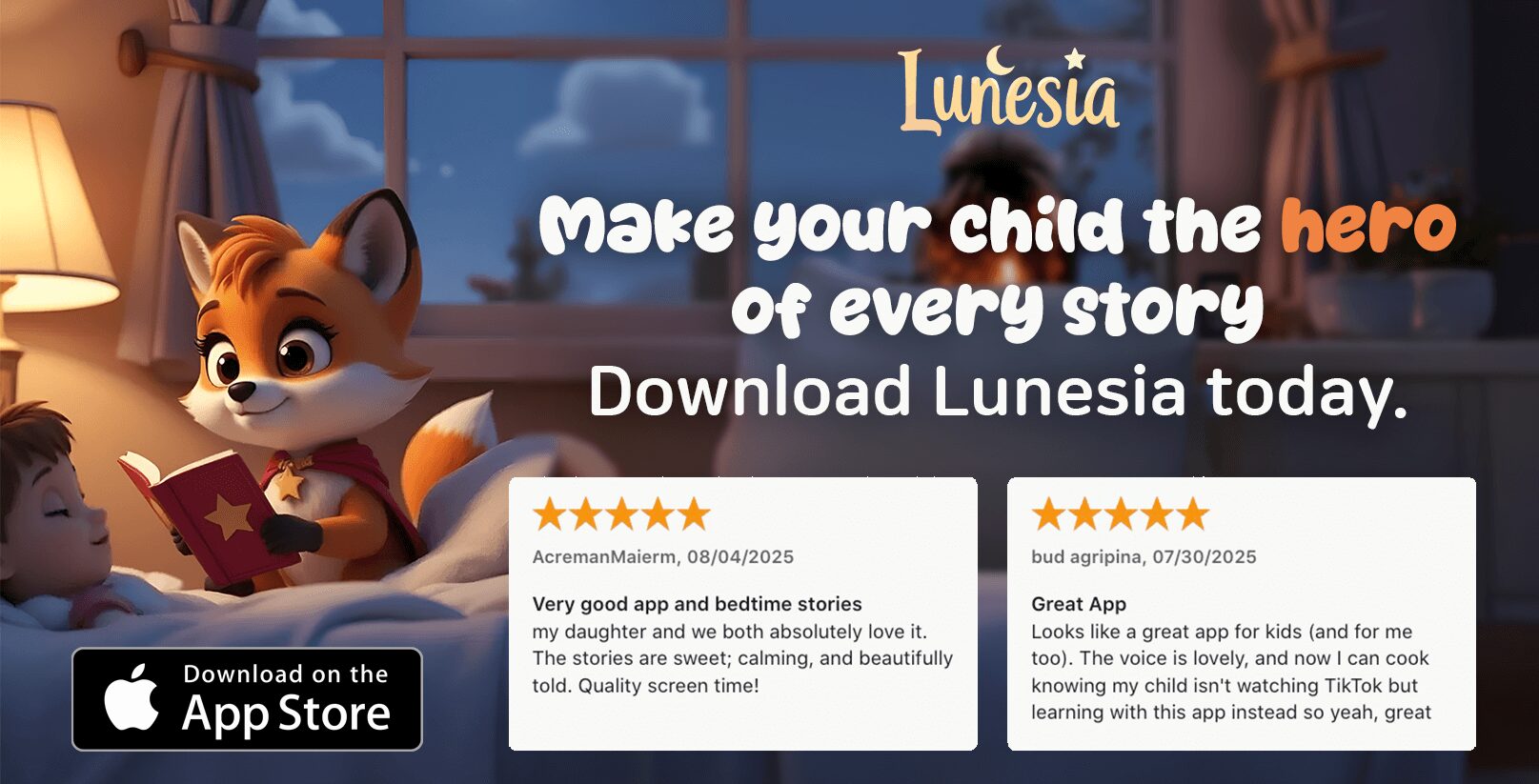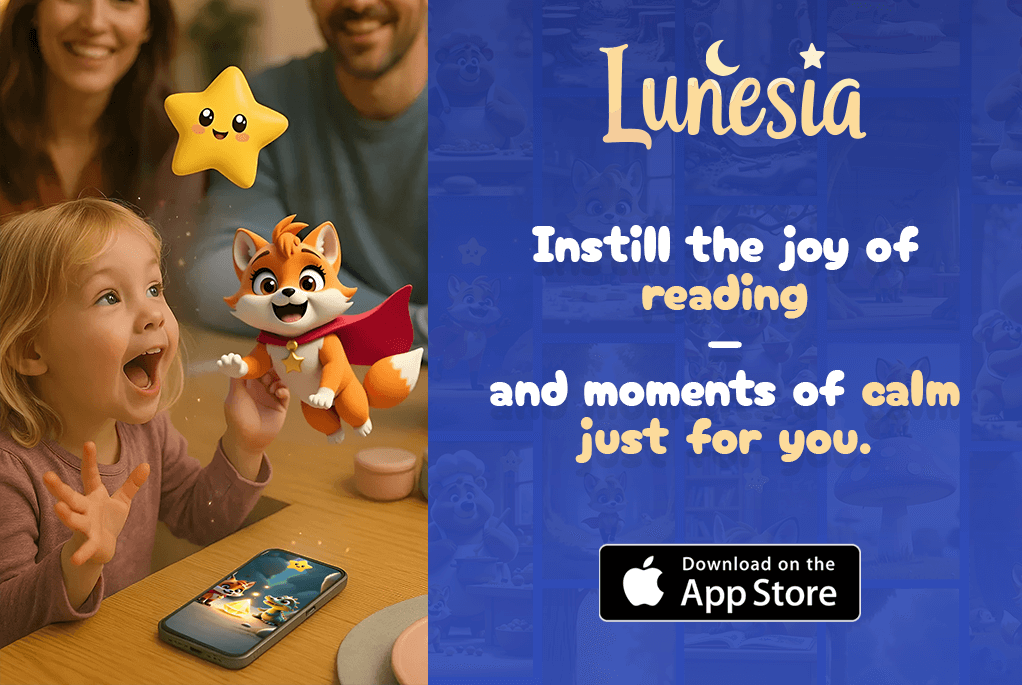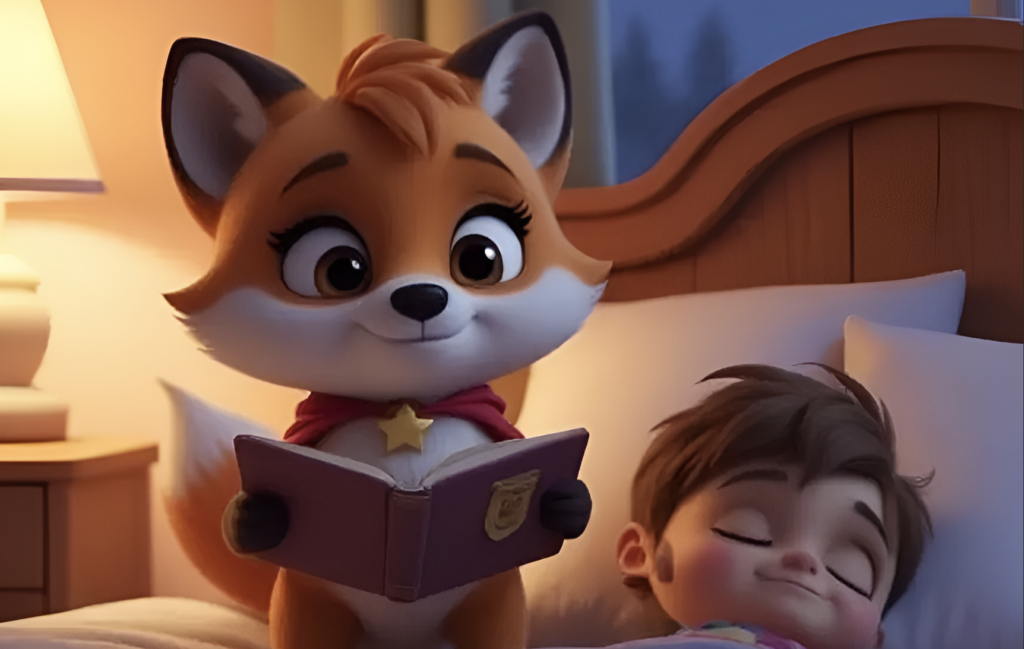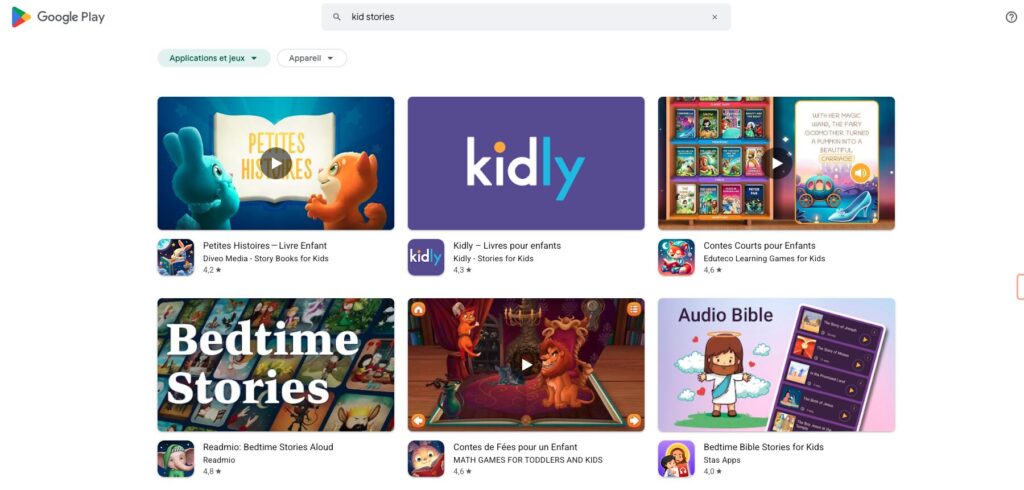As a parent, have you ever wondered what sets the foundation for a child’s lifelong love of learning? Is it the right educational approach that can make all the difference? I’ve seen firsthand how crucial those early years are for a child’s development. It’s when their brains are forming connections at lightning speed!
Lunesia’s approach to supporting early childhood education isn’t just about academic readiness; it’s about nurturing the whole child through intentional, developmentally appropriate practices. By focusing on comprehensive education goals, we create a perfect environment for your child to thrive in all developmental domains.
In this article, I’ll walk you through the top 5 ways we support your child’s development, from physical growth to social-emotional intelligence. You’ll discover how our structured approach sets your little one up for lifelong success.
Understanding the Importance of Early Childhood Education Goals
Early childhood education goals play a vital role in shaping a child’s cognitive, social, and emotional growth. As a parent or educator, setting clear objectives helps create a structured learning environment that encourages curiosity and a love for learning. By establishing these goals, we can foster a child’s overall development and lay the foundation for future success.
The Foundation of Lifelong Learning
The first five years of a child’s life are a critical period for development, laying the groundwork for all future learning. By implementing thoughtful early childhood education goals, we create a roadmap for children to develop essential skills at the right time and in the right sequence. This intentional approach to learning helps children build a strong foundation for lifelong success.
How Quality Early Education Impacts Child Development
Quality early education is about more than just preparing children for kindergarten; it’s about nurturing curious minds, healthy bodies, and compassionate hearts. Research shows that children who participate in programs with clear developmental goals exhibit stronger cognitive abilities, better social skills, and greater emotional regulation. By focusing on holistic development, we can help children thrive in all areas.
The Role of Structured Goal-Setting in Early Learning
Structured goal-setting creates a framework that helps children understand expectations, celebrate achievements, and develop confidence. By setting clear goals, we can encourage children to take on new challenges and develop a growth mindset. This approach also helps parents and educators track progress and make informed decisions about a child’s education. For more information on how Lunesia supports early childhood education goals, visit our website.
Comprehensive Developmental Support Through Lunesia Early Childhood Education Goals
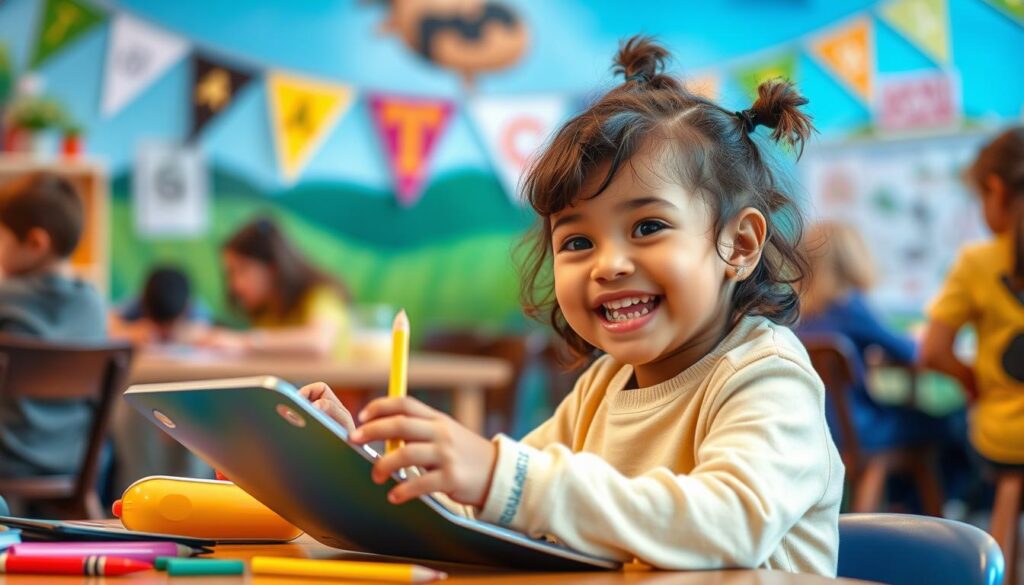
Our early childhood education program at Lunesia is designed to support comprehensive developmental goals. We believe that a strong foundation in early childhood is crucial for a child’s future success.
Physical Development: Fine and Gross Motor Skills
At Lunesia, we’ve designed our developmental support program to address crucial physical milestones. Our fine motor skill activities are carefully sequenced to help your child progress from grasping large objects to the precise finger movements needed for writing and cutting. We’ve incorporated gross motor development goals that build strong bodies and strengthen neural connections supporting reading readiness and mathematical thinking.
Cognitive Development: Building Critical Thinking Skills
Our cognitive development curriculum focuses on building critical thinking skills through problem-solving activities, open-ended questions, and exploration-based learning. This approach makes your child an active participant in their education, fostering a love for learning and discovery.
Self-Care Skills: Fostering Independence
What makes us proud of our program is the emphasis on self-care skills. Watching a child beam with pride when they zip their coat independently or successfully wash their hands shows us they’re developing the confidence and independence that will serve them throughout life. Each developmental goal at Lunesia is thoughtfully designed to build upon previous achievements, creating a seamless progression that honors each child’s individual pace while gently encouraging growth.
By supporting early childhood education goals, Lunesia helps children build a strong foundation for lifelong learning. Our program is designed to be comprehensive, addressing physical, cognitive, and self-care skills to ensure that children are well-rounded and prepared for future academic success.
Fostering Academic Excellence with Customized Learning Approaches
At Lunesia, we believe that fostering academic excellence in young children requires a tailored approach to learning. Our academic programs are designed to cater to the individual needs of each child, ensuring that they receive the most effective support for their development.
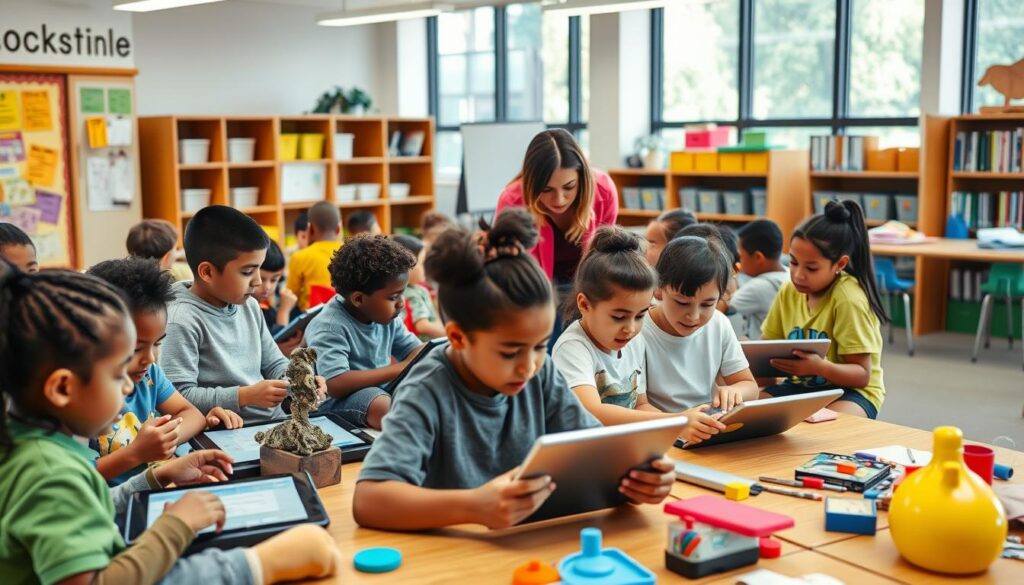
Language and Literacy Development Strategies
Our language and literacy goals go beyond mere letter recognition. We create rich language environments where children engage with stories, develop vocabulary, and begin to understand the magic of written communication. By making language learning fun and interactive, we lay a strong foundation for future academic success.
For instance, our teachers use a variety of engaging activities such as storytelling sessions, word games, and reading aloud to stimulate language development. These activities not only enhance vocabulary but also foster a love for reading and learning.
Numeracy and Mathematical Foundations
We’re passionate about introducing mathematical concepts through hands-on activities that make math tangible and exciting. By counting real objects, creating patterns with blocks, and measuring ingredients during cooking projects, children develop a deep understanding of numeracy and mathematical foundations.
| Activity | Learning Outcome |
|---|---|
| Counting objects | Understanding numbers and quantities |
| Creating patterns with blocks | Recognizing sequences and relationships |
| Measuring ingredients | Understanding units and measurements |
Science and Discovery: Nurturing Natural Curiosity
What sets Lunesia apart is our integration of science exploration into daily activities. We encourage children to observe, predict, experiment, and ask “why” questions, revealing their developing critical thinking skills. By nurturing their natural curiosity, we help children develop a deeper understanding of the world around them.
“The most important thing in education is to teach children how to think, not what to think.” – This quote resonates with our approach to science and discovery, where we focus on fostering critical thinking and curiosity.
By adopting a personalized learning approach, we aim to make education a joyful and engaging experience for young minds. Our teachers are skilled at adapting activities to meet each child exactly where they are, ensuring that every child achieves their full potential.
Building Social-Emotional Intelligence in Young Learners
Social-emotional intelligence is a vital skill set that we can nurture in young children to support their overall development. At Lunesia, we believe that social-emotional intelligence is the foundation for relationships, learning, and mental health throughout life.
Nurturing Positive Relationships
We’ve created specific goals around helping children develop positive relationships—teaching them to take turns, share resources, and resolve conflicts through words rather than actions. Our teachers model the social-emotional behaviors we hope to see, creating a classroom community where children feel safe to practice these critical skills with gentle guidance.
Emotional Regulation Strategies
Our emotional regulation curriculum includes activities that help children identify their feelings, express them appropriately, and develop coping strategies for big emotions. These skills are better predictors of academic success than early reading or math abilities, making them a crucial part of our early childhood education program.
Creating an Anti-Bias Environment
I’m particularly proud of our anti-bias approach that helps children develop comfort with diversity, accurate language for human differences, and the ability to recognize and speak up about unfairness. We integrate these social-emotional goals throughout the day—during circle time, free play, transitions, and even conflicts, which we view as learning opportunities rather than disruptions.
By focusing on social-emotional intelligence, we empower children to build strong relationships, achieve academic success, and develop a strong sense of self. Parents often tell us they see the difference in how their children handle frustration, express needs, and show empathy for others—these aren’t just classroom skills but life skills that strengthen family relationships too.
Collaborative Goal-Setting: Partnering with Families for Success
At Lunesia, we believe that when parents and educators work together, we can achieve remarkable things for our children. This collaborative approach is fundamental to our early childhood education goals.
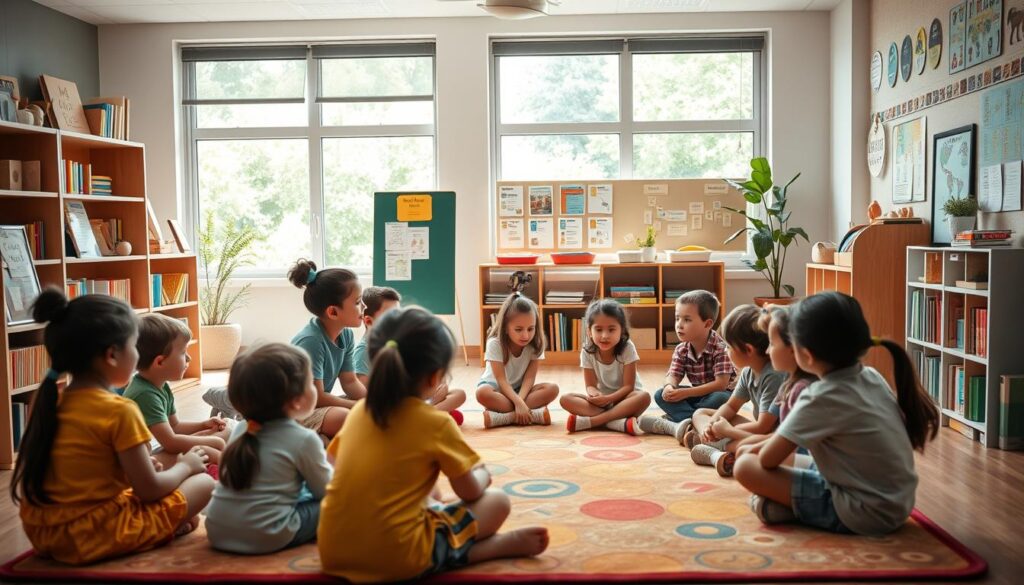
Creating Measurable Progress with SMART Goals
The SMART framework—Specific, Measurable, Achievable, Relevant, and Time-bound—is a powerful tool we use to create realistic goals for young learners. By making sure goals are specific, we can focus on particular skills or knowledge areas that need development.
For example, a SMART goal for a preschooler might be to “Recognize and name five new animals each week.” This goal is specific, measurable, achievable, relevant to their curriculum, and time-bound to a weekly schedule.
| SMART Criteria | Example Goal |
|---|---|
| Specific | Recognize and name five new animals |
| Measurable | Count and identify animals weekly |
| Achievable | Learning five new animals is challenging but achievable |
| Relevant | Animal recognition is part of the curriculum |
| Time-bound | Achieve this goal within one week |
Effective Communication: The Key to Successful Collaboration
Regular check-ins between educators and parents are crucial for tracking progress, celebrating achievements, and adjusting approaches as needed. By maintaining open lines of communication, we ensure that everyone is on the same page regarding a child’s development.
Our educators provide parents with simple, engaging activities to do at home that complement classroom learning. This consistent support across different environments helps children develop confidence and reinforces their learning.
Celebrating Progress and Adjusting Goals
We celebrate every achievement, no matter how small, because we understand that early childhood development is not always linear. Some skills develop quickly, while others require patience and consistent practice.
By regularly reviewing and adjusting goals, we can ensure that they remain relevant and challenging for each child. This flexible approach allows us to respond to changing needs and interests, keeping the learning process engaging and effective.
Conclusion: Empowering Children to Reach Their Full Potential with Lunesia
By focusing on the interconnected aspects of child development, Lunesia’s approach to early childhood education goals provides a comprehensive foundation for lifelong learning. Our method isn’t about pushing children to achieve milestones faster; it’s about creating the right environment for each child to develop fully and joyfully at their own pace.
The early childhood years are precious and fleeting, and our goal-setting approach ensures we make the most of this critical developmental window while preserving the wonder and delight of childhood. I’ve witnessed countless children transform from hesitant, uncertain learners to confident, curious explorers through our thoughtful goal-setting process and supportive learning environment.
Parents often tell me that the skills their children develop at Lunesia extend far beyond academic readiness. They see their children becoming problem-solvers, communicators, and compassionate friends. Whether your child is just beginning their early education journey or you’re looking to enhance their current experience, Lunesia’s approach to early childhood education goals provides the structure, support, and joy that leads to lifelong learning success.
I invite you to schedule a visit to see firsthand how our goal-setting approach creates an environment where children don’t just learn—they thrive, connect, and discover the joy of becoming their best selves. For more information on our programs and approach, you can visit our review page.
FAQ
What are the benefits of setting developmental goals for my child?
Setting developmental goals helps your child grow and develop new skills, such as critical thinking and problem-solving. By setting achievable goals, you can track progress and identify areas where your child needs extra support, ensuring they reach their full potential.
How can I support my child’s language development at home?
You can support your child’s language development by reading together, engaging in conversations, and encouraging them to express their thoughts and feelings. This helps build their language and literacy skills, laying the foundation for future academic success.
What role do educators play in helping my child achieve their developmental goals?
Educators play a vital role in supporting your child’s development by creating a nurturing environment, designing engaging lesson plans, and working with you to set and achieve goals. They help foster a love of learning and promote social-emotional intelligence in young learners.
How can I stay involved in my child’s education and ensure they’re meeting their goals?
You can stay involved by attending parent-teacher conferences, volunteering in the classroom, and communicating regularly with educators. This helps you stay informed about your child’s progress and work together to adjust goals as needed.
What strategies can help my child develop positive relationships with peers and educators?
Strategies like role-playing, group activities, and encouraging empathy can help your child develop positive relationships. By teaching your child to respect and appreciate diversity, you can help them build strong, healthy relationships with others.
How can I help my child develop self-care skills and become more independent?
You can encourage your child to develop self-care skills by giving them opportunities to practice tasks like dressing, feeding, and using the bathroom. By gradually releasing responsibility to your child, you can help them become more confident and independent.
